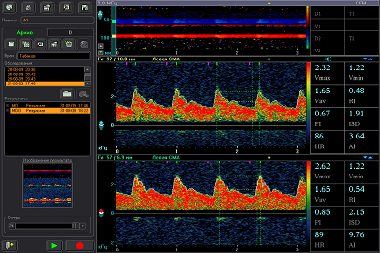Medical procedures >>>> What is Transcranial Doppler sonography?
What is Transcranial Doppler sonography?

Transcranial Doppler is an ultrasound scan done to monitor the blood vessels in the brain. In this way, the state of the intracranial vessels of the brain, which lie deep and inaccessible to other types of ultrasound, is studied.
Transcranial Doppler ultrasound allows you to study the intravascular bed, the degree of damage to the vascular wall, changes in blood flow in various painful conditions.
This method works in conditions where blood vessels are located in areas that are difficult to access for ultrasound examination, for example, when the passage of ultrasound is obstructed by the thick bones of the skull.
In addition to diagnosing cerebral vessels, transcranial Doppler is used to scan the vertebral and cervical arteries and veins.
Transcranial Doppler ultrasonography is used to diagnose the causes of headaches, dizziness, unclear causes of fainting, tinnitus, detection of vascular anomalies, in the study of the consequences of traumatic brain injury, cerebrovascular accident, and transient ischemic attacks.
In the study, the result is interpreted and may vary depending on age, blood pressure level.
There is an interpretation of the physical indicators of the blood flow rate in the vessels, the resistance of the blood flow. Studies are carried out with a change in the position of the body (lying, standing, tilted), with compression of blood vessels, in a state of spasm of the vascular wall.
The transcranial Doppler study method has its own drawbacks, the main of which is the inability to visualize the vessels under study.

Read

Read



























